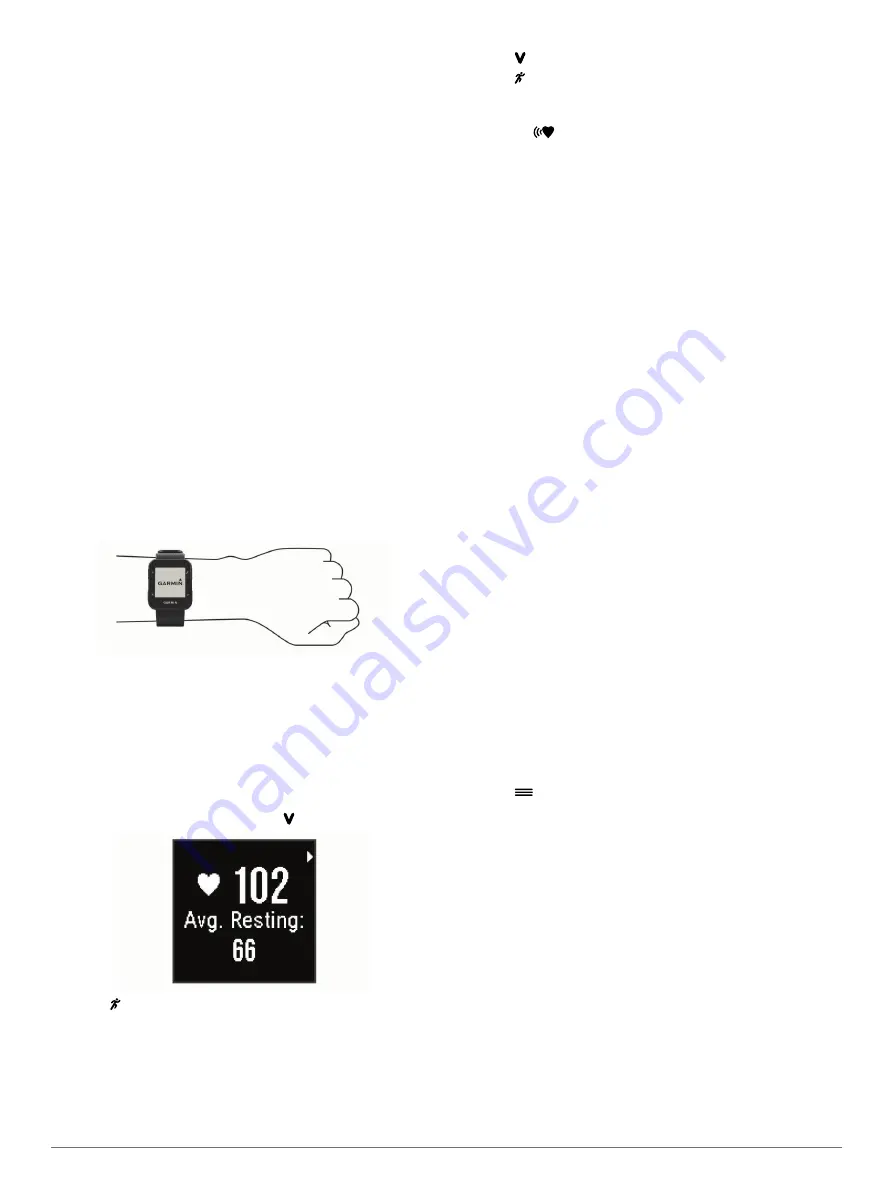
minutes. Your total vigorous intensity minutes are doubled when
added.
Earning Intensity Minutes
Your Forerunner device calculates intensity minutes by
comparing your heart rate data during an activity to your
average resting heart rate. If heart rate is turned off, the device
calculates moderate intensity minutes by analyzing your steps
per minute.
• Start a timed activity for the most accurate calculation of
intensity minutes.
• Exercise for at least 10 consecutive minutes at a moderate or
vigorous intensity level.
Sleep Tracking
While you are sleeping, the device monitors your movement.
Sleep statistics include total hours of sleep, sleep levels, and
sleep movement. You can set your normal sleep hours in the
user settings on your Garmin Connect account. You can view
your sleep statistics on your Garmin Connect account.
Heart Rate Features
The Forerunner 35 has a wrist-based heart rate monitor and is
compatible with ANT+
®
heart rate monitors. You must have a
heart rate monitor to use the features described in this section.
Wearing the Device and Heart Rate
• Wear the Forerunner device above your wrist bone.
NOTE:
The device should be snug but comfortable, and it
should not move while running or exercising.
NOTE:
The heart rate sensor is located on the back of the
device.
• See (
) for more information about
wrist-based heart rate.
Viewing Your Heart Rate Data
The heart rate screen displays your current heart rate in beats
per minute (bpm) and your average resting heart rate for the last
7 days.
1
From the time of day screen, select .
2
Select to view your heart rate data for the last 4 hours.
Broadcasting Heart Rate Data to Garmin
®
Devices
You can broadcast your heart rate data from your Forerunner
device and view it on paired Garmin devices. For example, you
can broadcast your heart rate data to an Edge
®
device while
cycling, or to a VIRB
®
action camera.
NOTE:
Broadcasting heart rate data decreases battery life.
1
Select to view the heart rate screen.
2
Select twice.
3
Select
Broadcast HR
.
The Forerunner device starts broadcasting your heart rate
data, and
appears.
NOTE:
You can view only the heart rate screen while
broadcasting heart rate data.
4
Pair your Forerunner device with your Garmin ANT+
compatible device.
NOTE:
The pairing instructions differ for each Garmin
compatible device. See your owner's manual.
TIP:
To stop broadcasting your heart rate data, select any
key, and select Yes.
About Heart Rate Zones
Many athletes use heart rate zones to measure and increase
their cardiovascular strength and improve their level of fitness. A
heart rate zone is a set range of heartbeats per minute. The five
commonly accepted heart rate zones are numbered from 1 to 5
according to increasing intensity. Generally, heart rate zones are
calculated based on percentages of your maximum heart rate.
Fitness Goals
Knowing your heart rate zones can help you measure and
improve your fitness by understanding and applying these
principles.
• Your heart rate is a good measure of exercise intensity.
• Training in certain heart rate zones can help you improve
cardiovascular capacity and strength.
• Knowing your heart rate zones can prevent you from
overtraining and can decrease your risk of injury.
If you know your maximum heart rate, you can use the table
(
) to determine the best
heart rate zone for your fitness objectives.
If you do not know your maximum heart rate, use one of the
calculators available on the Internet. Some gyms and health
centers can provide a test that measures maximum heart rate.
The default maximum heart rate is 220 minus your age.
Setting Your Maximum Heart Rate
The device uses your user profile information from the initial
setup to estimate your maximum heart rate and determine your
default heart rate zones. The default maximum heart rate is 220
minus your age. For the most accurate calorie data during your
activity, you should set your maximum heart rate (if known).
1
Select
>
Settings
>
User Profile
>
Max. HR
.
2
Enter your maximum heart rate.
Letting the Device Set Your Heart Rate Zones
The default settings allow the device to detect your maximum
heart rate and set your heart rate zones as a percentage of your
maximum heart rate.
• Verify that your user profile settings are accurate (
).
• Run often with the wrist or chest heart rate monitor.
• Try a few heart rate training plans, available from your
Garmin Connect account.
• View your heart rate trends and time in zones using your
Garmin Connect account.
Smart Features
Bluetooth Connected Features
The Forerunner device has several Bluetooth connected
features for your compatible smartphone or mobile device using
4
Heart Rate Features


































